Pre-employment screening ensures you hire the right people for your business. It helps you find the best candidates by objectively assessing their skills and qualities.
In this blog post, we compare Adaface and Plum, two key players in the pre-employment assessment space. By the end, you'll know which platform suits your hiring needs best.
Explore this post with:
Table of contents
How does Adaface work?
Adaface is a leading platform facilitating pre-employment assessments tailored to specific job roles. The platform is known for providing a diverse range of tests that cater to various industries and skill requirements.
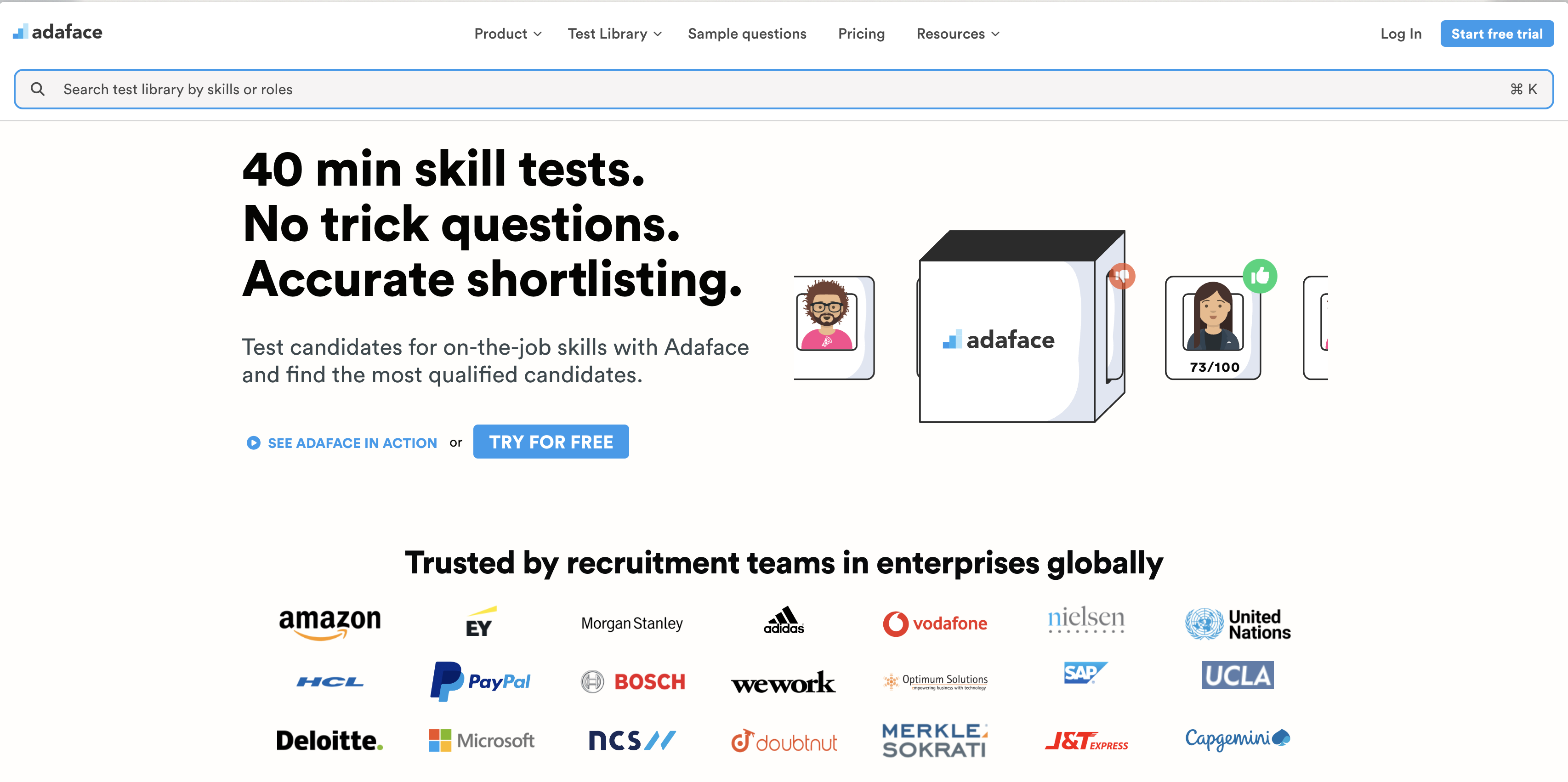
Recruiters use Adaface to craft role-specific assessments, making the hiring process more strategic and aligned with job requirements. This customization helps in effectively evaluating the candidates' real-world skills and fitment for the position.
Another popular use case is Adaface's support for coding and scenario-based questions. This flexibility ensures that both theoretical knowledge and practical application are assessed, giving a holistic view of the candidate's capabilities.
One standout feature of Adaface is its conversational interface, which significantly enhances the candidate experience by making assessments feel more interactive and less intimidating. For more insights on Adaface’s features and online assessment platform, explore our detailed pages.
How does Plum work?
Plum operates as a talent assessment platform that uses the Plum Discovery Survey, a 25-minute psychometric test designed to explore various personality traits, problem-solving abilities, and social skills of candidates. This process aims to create a detailed Plum Profile, assisting organizations in matching candidates to jobs and identifying potential leaders.
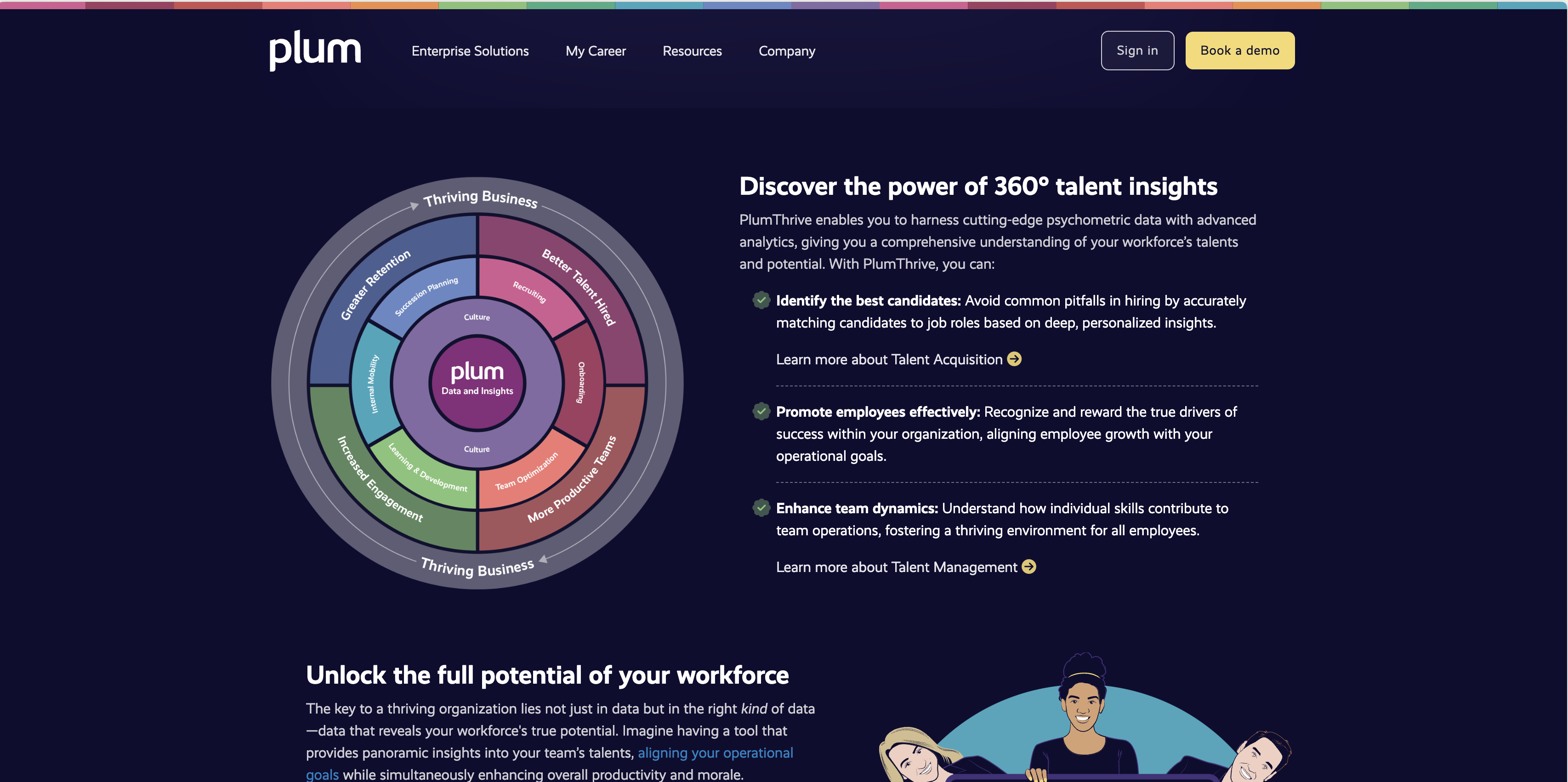
The assessment involves a structured eight-minute job analysis followed by the candidate's completion of the survey, which assesses personality, behavior, and soft skills. By comparing candidate results against the job's behavioral requirements, Plum helps recruiters craft a better understanding of who is likely to thrive in a specific role.
Notable features of Plum include its focus on personality assessment, which allows organizations to gauge suitability for specific roles, and the automated job analysis that streamlines matching candidates to positions. The detailed scoring helps recruiters visualize how well individuals align with job expectations.
However, Plum lacks a diverse range of assessment types, such as coding tests, situational judgment tests, and custom question support, which limits its adaptability for various job roles and might leave recruiters wanting more tailored evaluation options.
Adaface vs Plum: Test libraries
Adaface and Plum each offer different features within their test libraries. While Adaface boasts a broad range of tests including programming, language, personality, and job-specific assessments, Plum focuses primarily on personality and aptitude tests.
These test libraries can help recruiters streamline their hiring processes by evaluating candidates' skills before the interview stage. Using Adaface or Plum can save time and ensure a better fit for the job by assessing specific competencies tailored to the role.
Adaface's test library
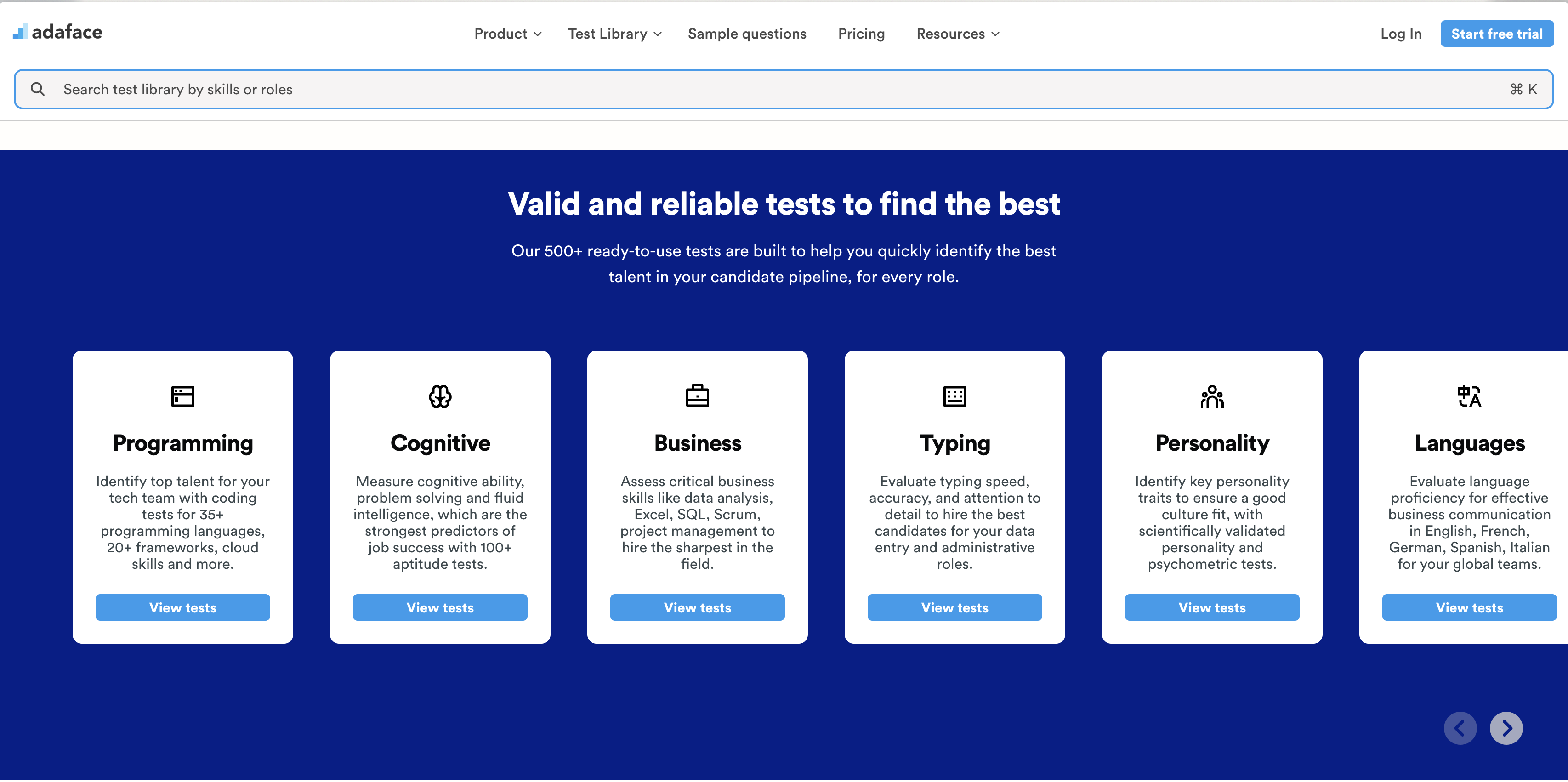
Adaface’s test library includes over 500 ready-to-use assessments for various skills. These range from technical skills like programming and artificial intelligence to soft skills and role-specific capabilities.
Recruiters use Adaface’s thorough and diverse test library to evaluate candidates on multiple fronts such as technical skills, cultural fit, and cognitive abilities. This versatility translates to more precise hiring decisions.
To see Adaface in action, hiring managers can create custom tests by choosing from a variety of questions, including coding challenges and scenario-based queries. Whether it's a typing test or a cognitive ability test, Adaface makes it simple to build the perfect assessment tailored to your job requirements.
Plum's test library
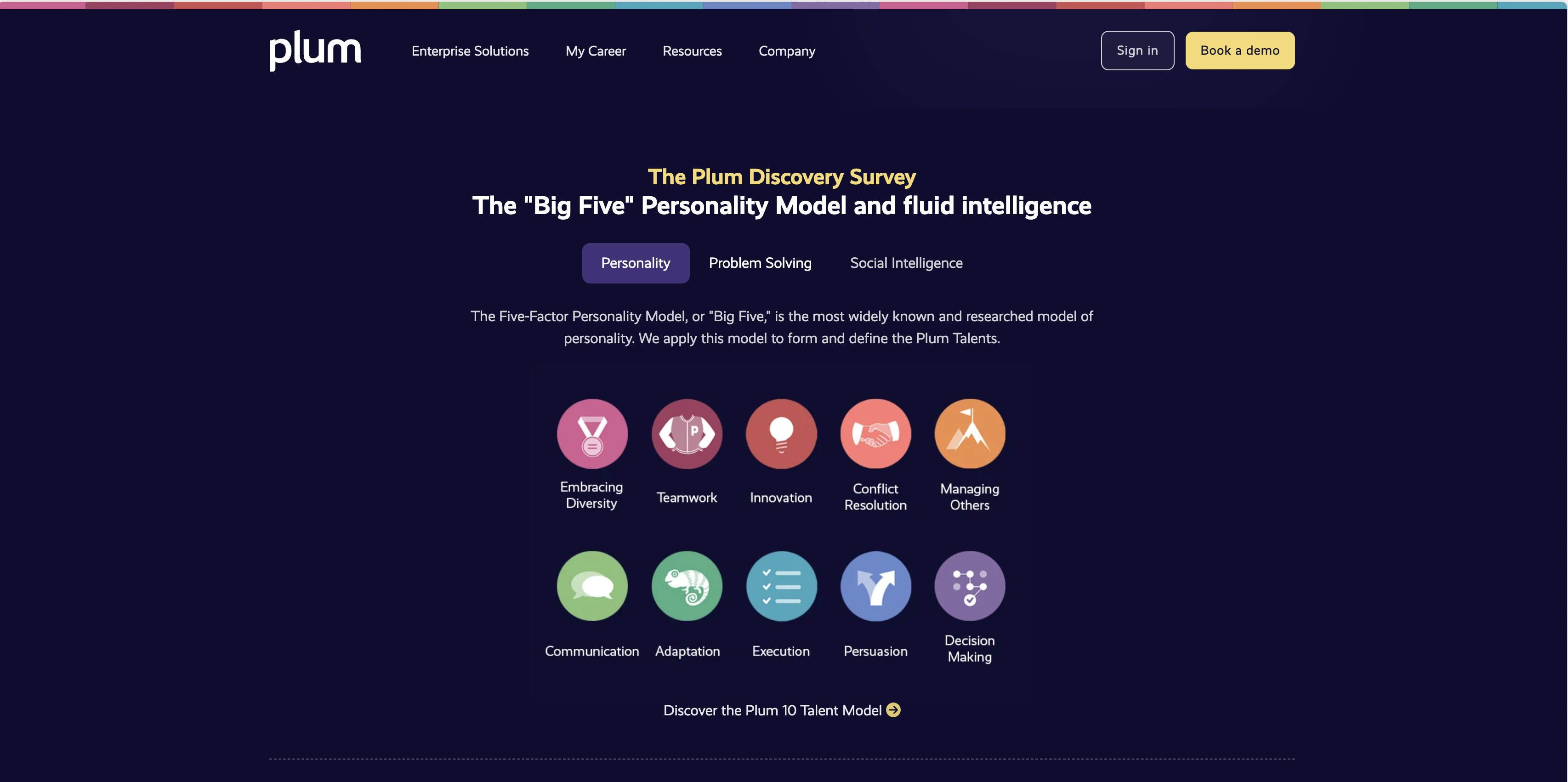
Plum's test library revolves around a personality assessment that measures ten specific patterns of thought, feeling, and behavior. This includes traits like teamwork and innovation, based on the well-researched Big Five personality model, making it a unique approach to understanding candidates.
The selling point of Plum’s library is its focus on social intelligence and problem-solving, allowing employers to gauge how candidates might fit into their organizational culture. This can be particularly helpful for roles that emphasize collaboration and adaptability.
However, Plum's offering lacks job-specific tests and the ability to customize assessments, which can limit its effectiveness when evaluating technical skills or tailoring evaluations to specific roles. This gap could leave recruiters wanting more tailored insights into candidates' capabilities.
Comparison of test libraries
Adaface vs Plum: Business, Marketing and Ops Roles
When it comes to finding the right talent, recruiters use skill assessments to ensure that candidates can handle the responsibilities of the job effectively. These tests allow companies to evaluate technical and non-technical skills before making a hiring decision.
Both Adaface and Plum offer functionalities for assessing candidates' skills, but with different focuses. Adaface stands out with its wide-ranging tests that include coding and role-specific assessments, while Plum emphasizes personality and cognitive skills evaluation.
Business, Marketing and Ops Roles with Adaface
Adaface provides a multitude of functionalities for screening on-the-job role-specific skills:
- Over 500 role-specific tests including IT, finance, and business domains
- Scenario-based MCQs and coding questions
- Customizable assessments tailored to job descriptions
- Artificial Intelligence and cloud technology assessments
Recruiters choose Adaface to test candidates' skills because it ensures that the assessments align with the specific role requirements. By using scenario-based questions, Adaface provides a closer reflection of real-world job situations.
Moreover, Adaface allows companies to add custom questions or even create tailor-made tests according to their unique needs. This flexibility ensures that recruiters can accurately gauge whether a candidate will fit into their team and thrive in their role.
Hiring Business, Marketing and Ops Roles with Plum
Plum emphasizes assessing personality and behavioral traits, but it lacks a comprehensive library for testing on-the-job skills specifically for non-developer roles. While they do have aptitude tests, their offerings around business and job-specific assessments are limited.
Their test library includes a variety of aptitude tests, which can be useful for roles that require numerical and logical reasoning. However, hiring managers looking for specific business skills or scenario-based assessments might find that Plum's options fall short for certain roles.
Moreover, Plum's absence of customizable tests for job descriptions means that companies cannot tailor assessments to match the unique demands of their roles. This could lead to a less effective evaluation process compared to solutions that allow for a more targeted approach.
Adaface vs Plum: Developer hiring
When hiring developers, you need to assess a candidate’s full range of technical skills to see if they align with your team and workload.
Look for a platform that offers a range of these tests, including coding and algorithmic-thinking challenges. You’ll also want to evaluate candidates’ ability to work with different frameworks and coding languages.
Hiring developers with Adaface
Adaface offers a comprehensive suite of functionalities for hiring developers, including coding questions for various languages, web frameworks, and mobile frameworks.
In contrast, Plum lacks these programming-specific functionalities, focusing more on general cognitive and personality assessments without the depth needed for technical roles.
Hiring developers with Plum
Plum primarily focuses on assessing personality and behavioral traits, making it well-suited for evaluating soft skills. However, the platform does not include coding or developer skills tests, leaving a gap for technical roles.
Employers can utilize Plum to gauge a candidate's cultural fit and potential for success within the team. This is particularly useful for roles where personal traits are as important as technical skills, but it won't suffice for developer assessments.
While Plum excels in evaluating behavioral competencies, it lacks the capability to measure hands-on coding skills, technical problem-solving, and specific programming knowledge. This means hiring managers would need to supplement Plum with other tools to fully assess developer candidates.
Comparison of developer hiring features
Adaface vs Plum: Candidate experience and company branding
Candidate experience plays a huge role in determining whether applicants complete a pre-employment assessment. If a test feels outdated or cumbersome, candidates are likely to abandon it midway.
When evaluating candidate experience, features like ease of use, support options, and mobile accessibility are often pivotal. These elements not only ensure higher completion rates but also enhance the overall perception of the company.
Candidate experience and company branding with Adaface
Adaface’s conversational interface makes the testing experience feel more like a friendly chat than a rigorous exam. This approach helps candidates feel at ease, improving their performance and overall satisfaction.
Mobile-friendly assessments are another standout feature of Adaface. Candidates can take their tests on any device, making it convenient for individuals on the go. This flexibility is particularly useful for non-coding assessments.
Adaface also provides excellent support through email and help documentation. Candidates can get immediate assistance and answers to their queries, reducing frustration and ensuring a smoother test-taking process. For more on candidate experience, check our in-depth guide.
Candidate experience and company branding with Plum
Plum offers a candidate support page filled with FAQs about technical issues and assessment parameters, which is a step in the right direction for candidate assistance. However, candidates only interact with Plum's branding, lacking the ability to see their potential employer's identity reflected in communications.
The selling point of Plum's candidate experience lies in its thorough support structure, helping candidates navigate technical hiccups while they complete assessments. This can reduce anxiety and ensure that candidates feel engaged and informed throughout the process.
Despite these positives, Plum misses out on features that would truly enhance the candidate experience. For instance, the absence of a conversational interface and mobile-friendly assessments may leave candidates feeling disconnected and less engaged than they could be.
Adaface vs Plum: Anti-cheating features
Online assessments are a convenient way to evaluate candidates, but they also pose a risk of cheating, which can undermine the fairness and accuracy of the results. That's why it's crucial for pre-employment testing platforms to have robust anti-cheating features to maintain the integrity of the assessments.
Anti-cheating features of Adaface
Adaface is committed to providing a secure and reliable testing environment with its comprehensive anti-cheating measures. Here are some of the key features that ensure the validity of your assessment results:
- User Authentication: Candidates are required to authenticate their identity before starting the test, preventing unauthorized access.
- Webcam and Browser Monitoring: Adaface tracks the candidate's webcam and browser activity, ensuring they remain focused on the assessment and don't engage in any suspicious behavior.
- Copy-Paste Protection: The platform disables the copy-paste functionality during tests, preventing candidates from sharing questions or copying answers from external sources.
- Plagiarism Detection: Adaface's advanced plagiarism detection system checks coding answers for similarities, ensuring originality and preventing cheating.
- Social Listening: The platform actively monitors social media channels for any potential leaks of assessment questions, allowing for swift action to maintain the integrity of the tests.
By implementing these robust anti-cheating measures, Adaface ensures a fair and secure testing environment, enabling you to make informed hiring decisions based on accurate and reliable candidate assessments.
Anti-cheating features of Plum
Plum’s assessments focus on measuring behavior and personality traits, rather than job-specific skills, through a series of statements that applicants choose from. This method minimizes the temptation to cheat since there are no clear-cut answers.
Plum’s approach can be beneficial for roles where personality fit is more important than specific skills. Because the questions are not easily googleable, it offers some level of cheating deterrence.
However, Plum lacks traditional anti-cheating features like IP address tracking, webcam monitoring, and browser activity logging, which can leave gaps in ensuring test integrity.
Comparison of anti-cheating features
Adaface vs Plum: Pricing and free trial
Pricing for pre-employment assessment tools can vary based on the scale of hiring and the features offered. Recruiters should look for transparent pricing models that align with their hiring needs.
Adaface pricing
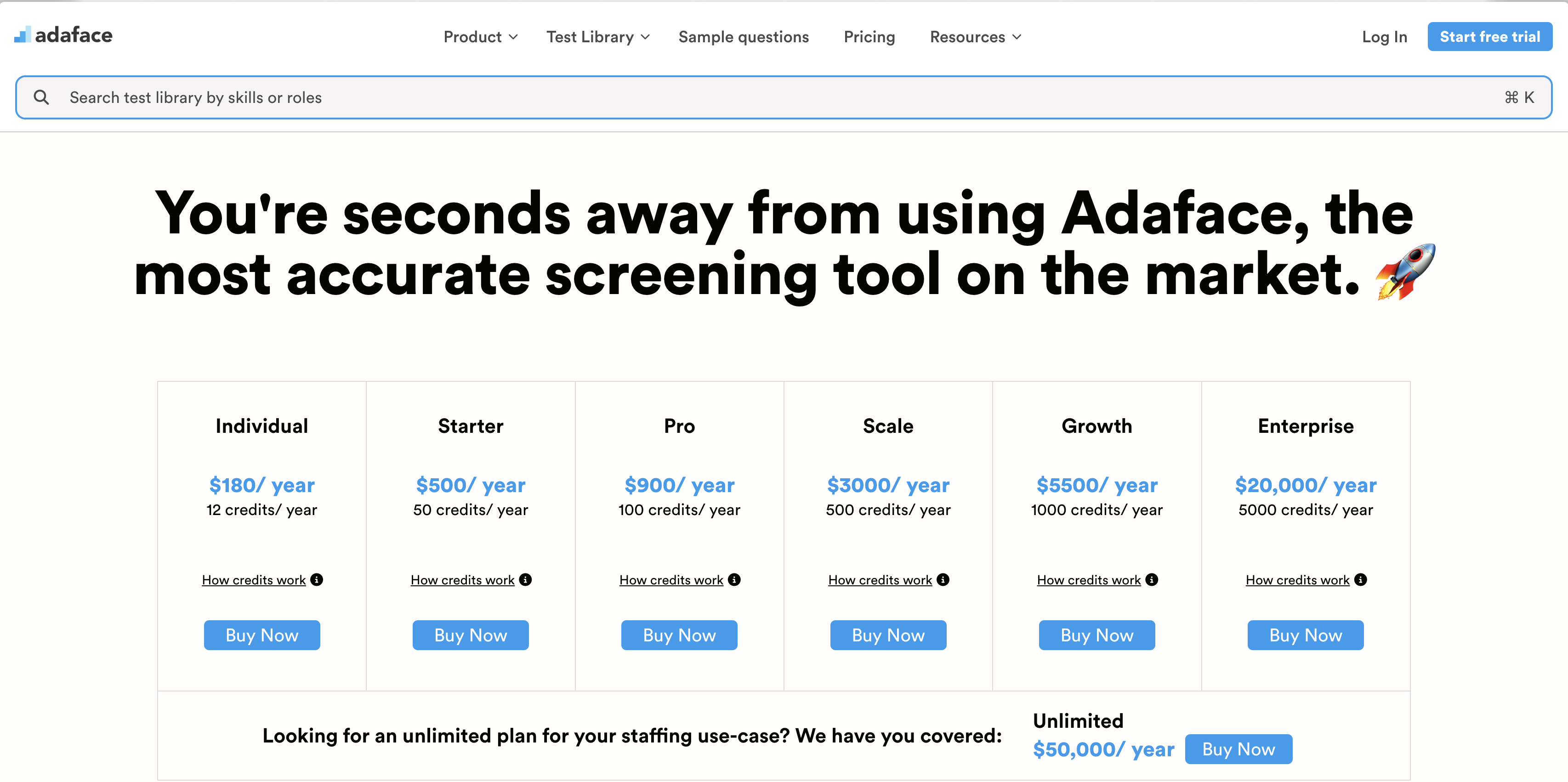
Adaface offers a range of pricing plans designed to suit different hiring scales and requirements. We provide a free trial with two sample tests and 5 credits so you can explore all features before making a purchase decision. From individual plans to enterprise solutions, there's a plan for everyone.
Our Individual plan starts at $180, perfect for small-scale hiring needs. For growing teams, the Starter plan at $500 for 50 credits offers more flexibility.
For larger organizations, we provide the Scale plan at $3000 for 500 credits and the Growth plan at $5500 for 1000 credits. Additionally, our Enterprise plan at $20000 for 400 credits and Unlimited plan at $50000 per year cater to extensive hiring needs.
Companies should consider the scale of their hiring needs and budget when choosing a plan. Our plans are designed to be flexible and scalable, ensuring you get the best value for your investment.
To explore our detailed pricing options, visit our Adaface Pricing page.
Plum pricing
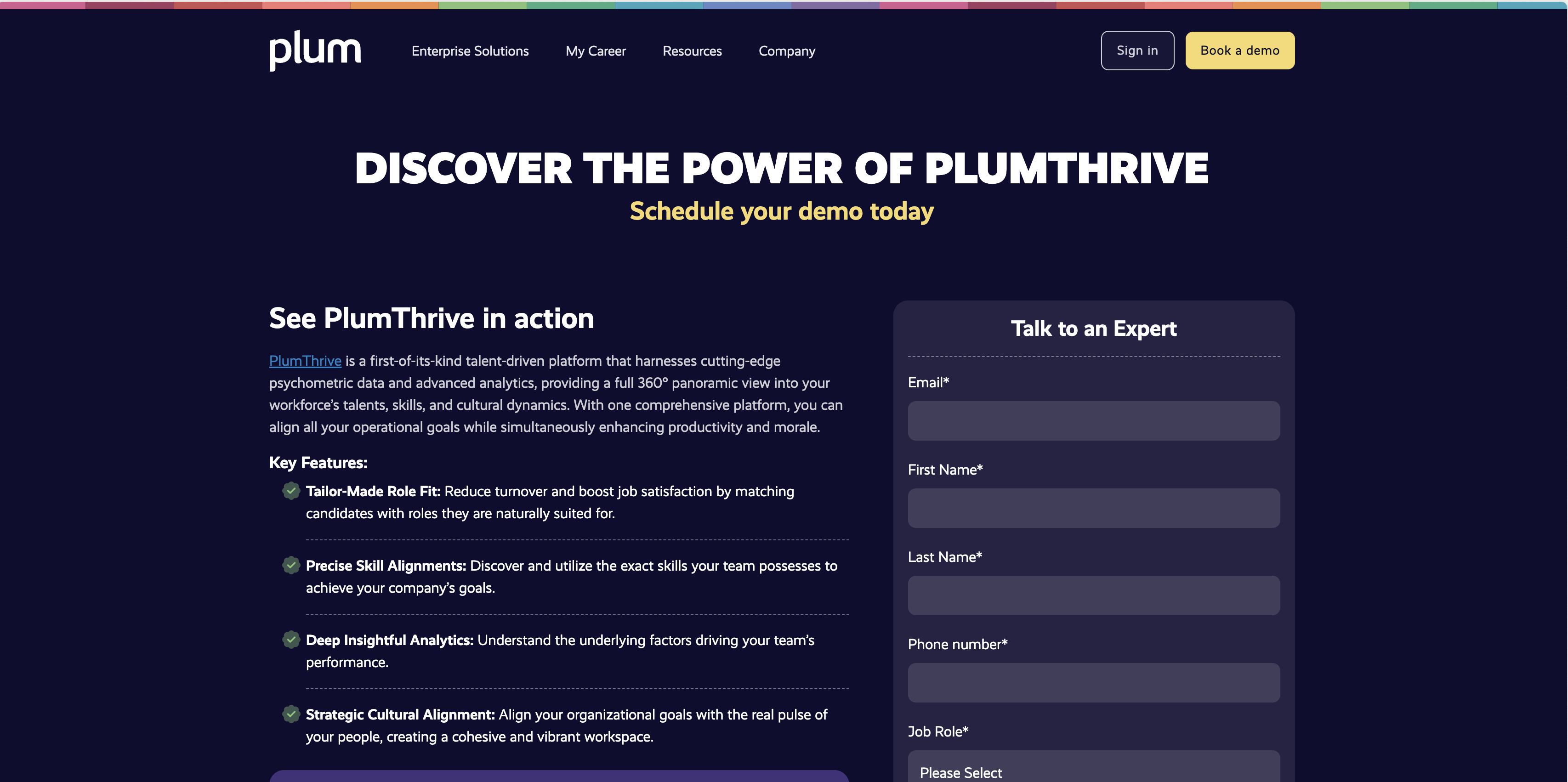
When it comes to pricing, Plum doesn’t lay it all out in the open. To get the specifics, you'll need to contact Plum directly. This means there are no readily available tiers or plans listed on their website for potential users to peruse. Whether you're a small startup or a large enterprise, you'll need to hop on a call to get a custom quote tailored to your needs, which can be a bit of a hassle for those who prefer instant, transparent information.
One thing to note is that Plum does not offer a free trial. This could be a deal-breaker for recruiters who want to explore all the platform's features before making a commitment. Additionally, there is no option for self-signup, meaning you can't dive in and start exploring on your own. You’ll have to wait for a sales representative to get you started, which might slow down your evaluation process.
Comparison of pricing
Adaface vs Plum: Scorecards, reporting and analytics
Good scorecards, reporting, and analytics help recruiters make smart hiring choices. They let you see how candidates did on tests, compare them, and spot top talent quickly. The best tools give you clear, detailed info you can easily share with your team.
Adaface scorecards, reporting and analytics
Adaface offers detailed scorecards that show how candidates perform across different skills. You get a neat radar chart comparing the candidate's scores to industry and company averages. Plus, you can see a breakdown of which topics a candidate aced or struggled with.
With Adaface, you can download reports in PDF, Excel, and CSV formats. There's also a handy public link option to share results with clients who don't have dashboard access. The platform even sends alerts when candidates pass tests, helping you move fast on promising applicants. For a closer look, check out this sample scorecard.
Plum scorecards, reporting and analytics
Plum provides detailed profile reports that highlight each candidate's top talents, work style, and work preferences. The scorecards emphasize behavioral and personality traits, offering insights into how candidates might fit into certain roles or teams.
These reports allow recruiters to compare assessment results against the automated job analysis criteria, ensuring alignment with job requirements. While the personality-focused insights can be useful, the absence of skill-specific assessments might leave some gaps in evaluating a candidate's technical capabilities.
However, Plum does lack features such as the ability to generate Excel and CSV reports, benchmarking capabilities, and a detailed audit timeline. These omissions can limit the depth and flexibility of the insights available to recruiters during the hiring process.
Comparison of scorecards, reporting and analytics
Adaface vs Plum: Enterprise and startup friendliness
When evaluating assessment providers, enterprise and startup friendliness depends on features like ATS integration, compliance with data protection laws, API access, and customizable user roles. These elements ensure the platform scales with business growth and adapts to specific needs.
Adaface's enterprise and startup friendliness
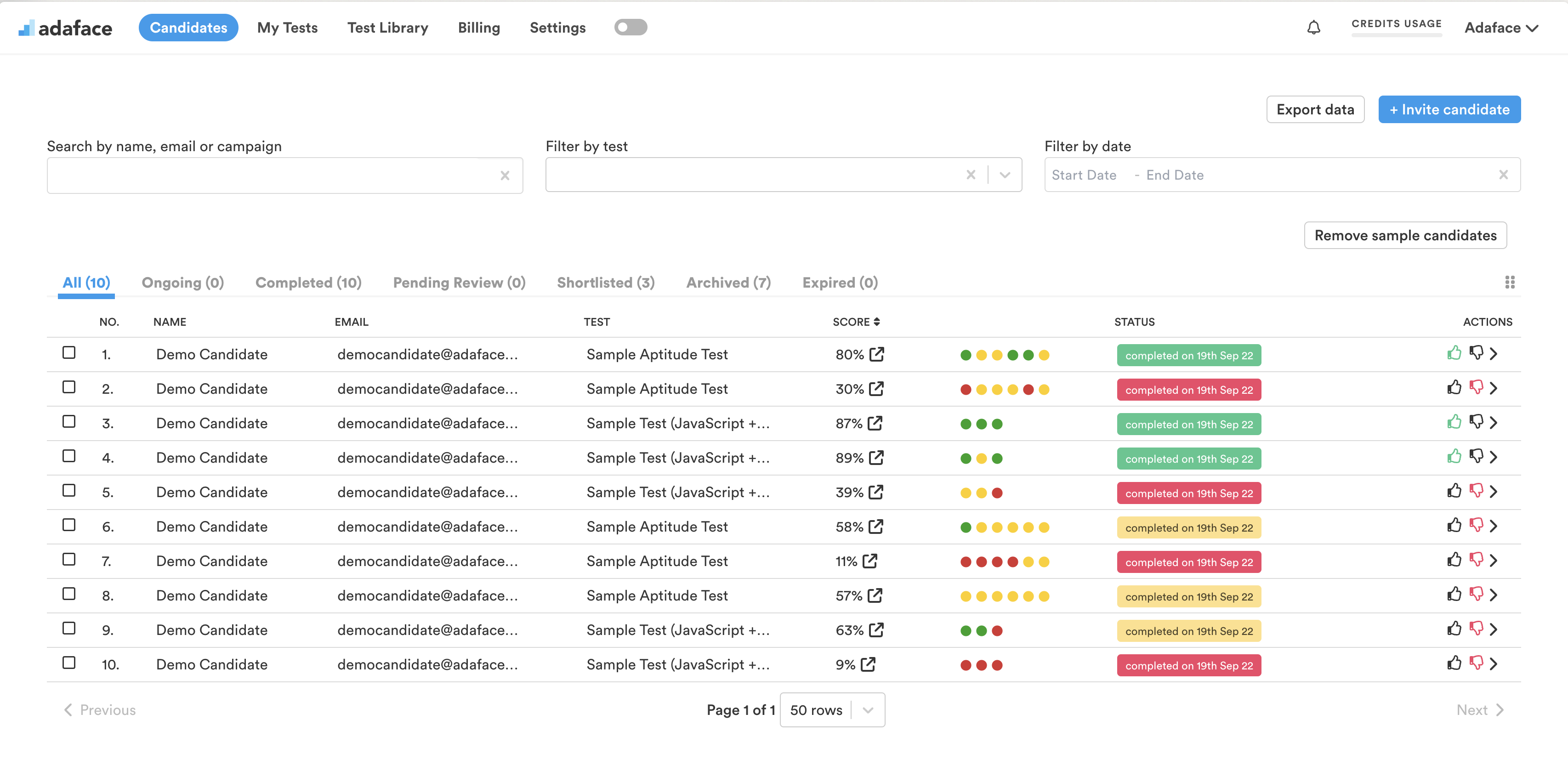
Adaface shines in enterprise settings by offering unlimited team seats and advanced role-based access controls. These features allow large teams to collaborate seamlessly without extra costs.
Startups will appreciate Adaface's flexibility, including multiple invite options such as email invites and public links, simplifying the hiring process for small teams. They can also perform bulk actions, making talent acquisition faster and less tedious.
For enterprises, Adaface provides support for custom data location, ensuring data security and compliance with local laws. Additionally, Adaface’s API allows for smooth integration with various HR systems, enhancing workflow automation and efficiency.
Plum's enterprise and startup friendliness
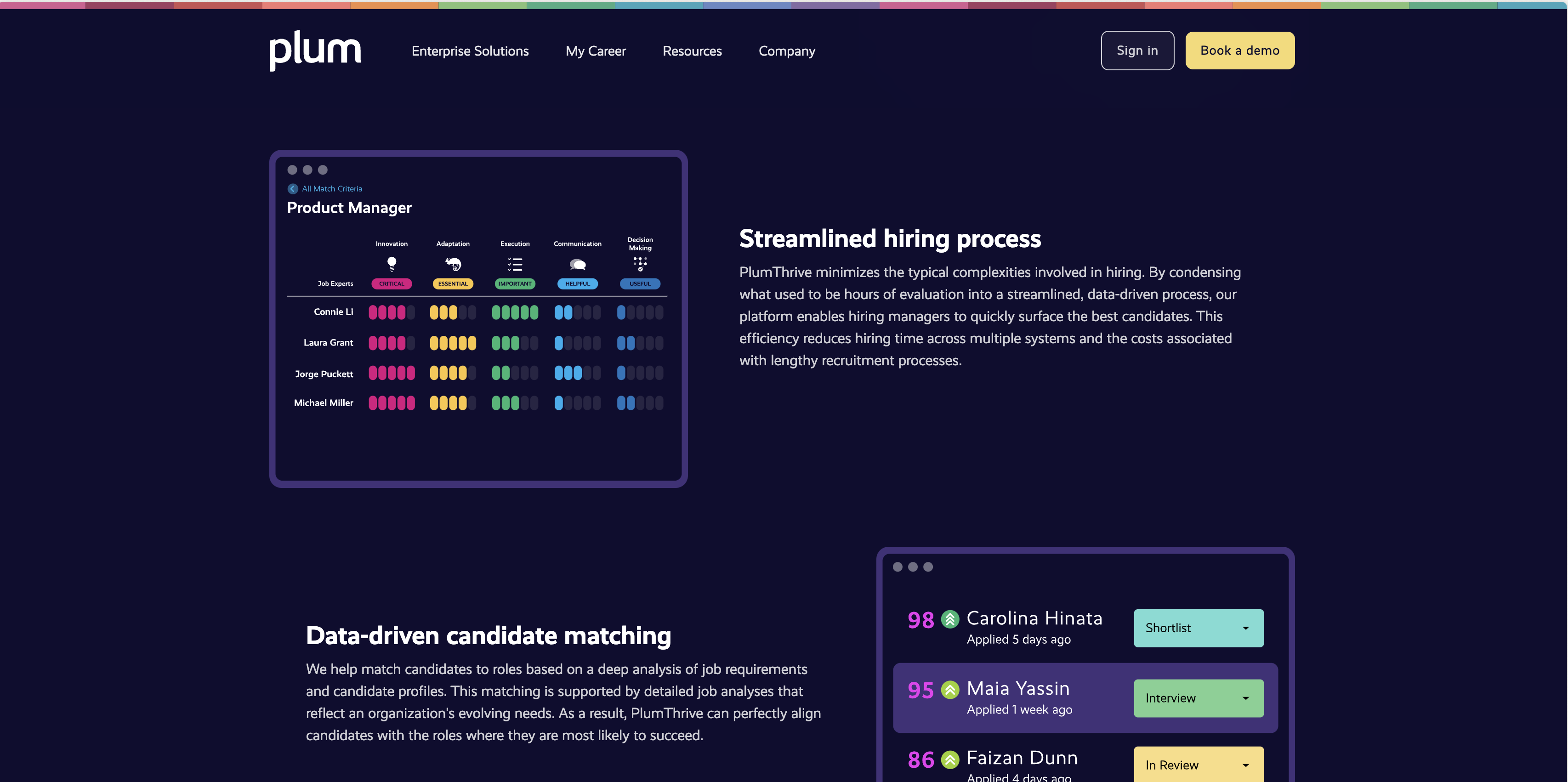
Plum offers ATS integration and is GDPR compliant, making it suitable for enterprises concerned with data privacy and seamless recruitment workflows. Their enterprise solution, PlumThrive, provides workforce analytics to help businesses understand job fit and potential.
For companies seeking in-depth insights into their workforce, PlumThrive delivers personalized career insights and quality hire predictions. This can be particularly useful for businesses aiming to enhance their talent management strategies.
However, Plum lacks features like custom API access, role-based access, and multiple question sets. This can limit its flexibility and scalability for enterprises and startups looking for more tailored assessment solutions.
Comparison of enterprise and startup friendliness
Adaface vs Plum: Assessment quality control
When it comes to assessments, quality control ensures that the tests you use are accurate, reliable, and fair. For recruiters, this means having confidence in the results, which can significantly impact hiring decisions.
Adaface's quality control features
Adaface implements a thorough quality control process that includes rigorous checks before any question is published. This ensures that every assessment question is not only relevant but also effective in measuring the intended skills.
In addition to pre-launch checks, Adaface actively listens to candidate and customer feedback to continuously improve tests. This feedback loop allows us to refine and enhance our question library based on real experiences.
Adaface also employs proprietary algorithms to monitor and assess the quality of questions over time. By replacing frequently used questions, we keep assessments fresh and challenging, which ultimately leads to a more accurate evaluation of candidates' skills. For more details on how we design our questions, check out our science page.
Plum's quality control features
Plum's quality control process relies on psychometric test theory, ensuring every candidate takes identical assessments. However, specifics about their quality checks before questions go live are sparse, leaving potential gaps in reliability.
There’s limited clarity on how often Plum reviews or updates their assessments. This could imply that the questions may not evolve with changing industry standards or candidate expectations, which can impact the relevance of their tests.
Moreover, with no apparent mechanism for incorporating candidate or customer feedback, there's a risk that Plum's assessments might lack a personal touch, missing out on valuable insights that could enhance the testing experience.
Comparison of quality control
Adaface vs Plum: Customer support
Knowing your pre-employment assessment platform has solid customer support can make all the difference in a smooth hiring process. Recruiters need quick and reliable assistance to ensure they can make the most of the platform's features.
Adaface's customer support features
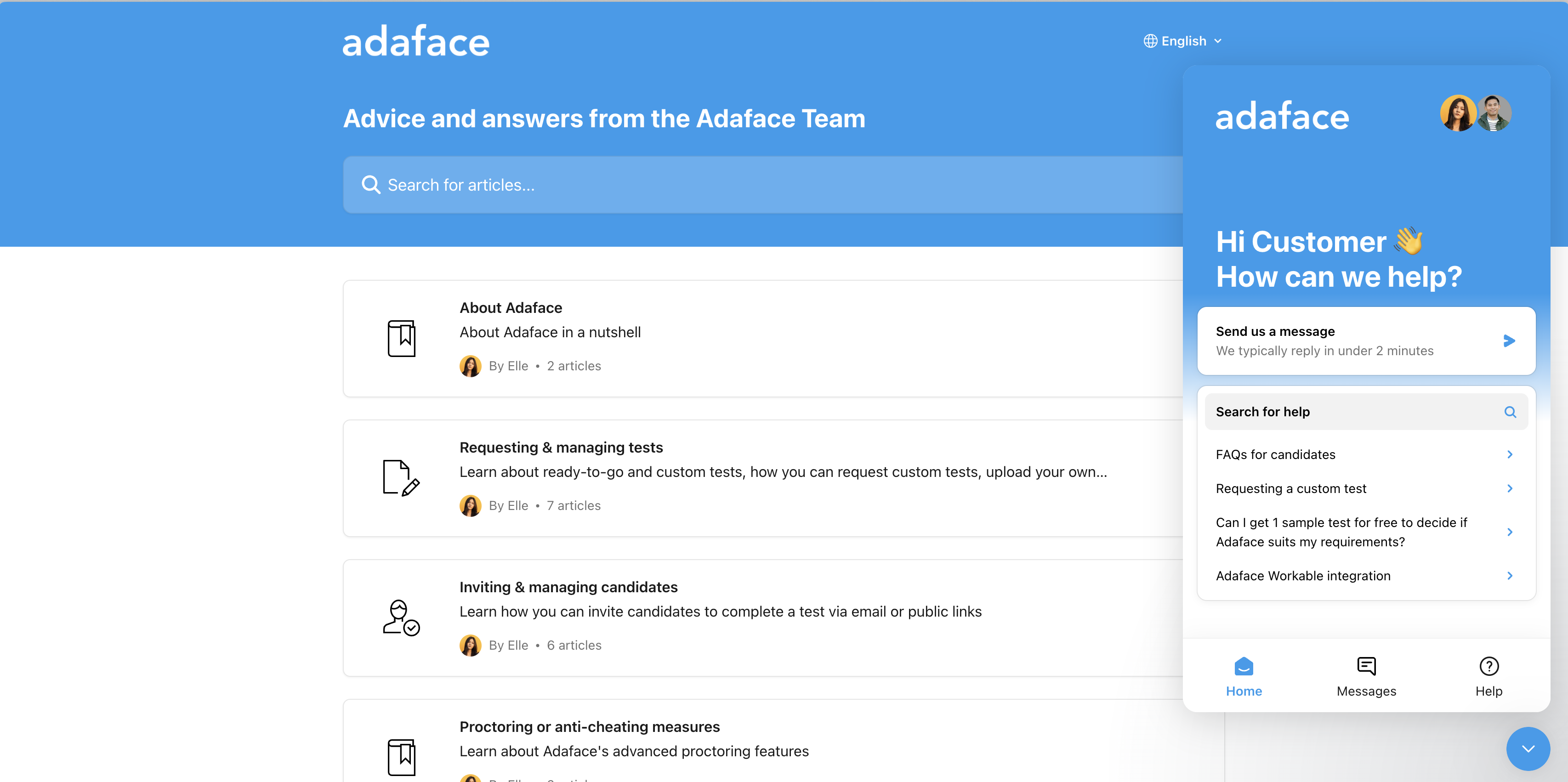
At Adaface, we offer a range of customer support options designed to help recruiters. From email support to live chat, we ensure all your questions are answered promptly.
Our extensive help center is packed with resources to guide you through every step, from creating assessments to interpreting results. And for those who prefer a personal touch, we provide phone assistance as well.
We also offer dedicated priority support for our enterprise plans, giving you a direct line to a customer success contact for any urgent needs. Plus, all new users benefit from our training and onboarding sessions to help you hit the ground running.
Adaface ensures you have all the support you need right from the start. Our live chat feature lets you get instant answers, while our email support is perfect for more detailed queries.
For recruiters looking for self-service options, our help center is a treasure trove of information. Whether you're setting up your first assessment or diving deep into analytics, we've got you covered.
Plum's customer support features
Plum provides customer support through email and an online knowledge base. Users can find troubleshooting articles and guides in their help center.
While email support is available, Plum doesn't offer live chat or phone assistance. There's also no mention of training or onboarding for new users.
Comparison of customer support
Adaface vs Plum: Conclusion
Both Adaface and Plum offer features that streamline recruitment processes. For instance, both platforms support personality tests and aptitude tests, which are great for evaluating candidate fit and cognitive abilities.
However, Adaface stands out with its broader range of tests, including programming, business, and language assessments. This versatility ensures you can hire for any role accurately.
Plum lacks certain features like situational judgment and AI tests, which are critical for some roles. Missing these can lead to incomplete assessments and potentially wrong hires.
Streamline hiring with skill tests
Adaface, on the other hand, provides all these essential assessments, ensuring you get a complete picture of each candidate. Plus, its conversational interface enhances the candidate experience.
Pre-employment assessments streamline the hiring process, saving time and reducing bias. They offer a range of tests to evaluate various skills and traits, ensuring you choose the right candidate.
Using these assessments, recruiters can improve hiring decisions by focusing on candidates' abilities rather than just resumes. This leads to better job performance and higher retention rates.
Adaface is the preferred choice for many recruiters due to its extensive test library and custom test creation. Explore our features or check out our blog to see how Adaface can enhance your hiring process.
Adaface vs Plum FAQs
Adaface offers a range of tests including programming, situational judgment, aptitude, business, typing, personality, language, finance, AI, and cloud tests.
No, Plum does not support coding questions. Adaface offers both coding questions and scenario-based MCQs.
Yes, Adaface can design custom tests by analyzing job descriptions to create the best matching test.
No, Plum does not offer a conversational interface. Adaface tests are designed to be candidate-friendly and conversational.
Yes, Adaface supports mobile for most assessments, making it convenient for candidates.
Yes, Adaface offers tests in multiple languages, including English, French, German, Italian, and Spanish across various proficiency levels.

40 min skill tests.
No trick questions.
Accurate shortlisting.
We make it easy for you to find the best candidates in your pipeline with a 40 min skills test.
Try for freeRelated posts



